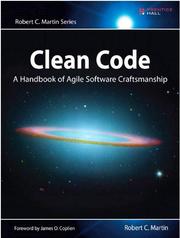| Listing 1 - 2 of 2 |
Sort by
|
Book
ISBN: 9780137043293 0137043295 Year: 2013 Publisher: Boston Addison-Wesley
Abstract | Keywords | Export | Availability | Bookmark
 Loading...
Loading...Choose an application
- Reference Manager
- EndNote
- RefWorks (Direct export to RefWorks)

ISBN: 0132350882 9780132350884 Year: 2007 Publisher: United Kingdom Prentice Hall
Abstract | Keywords | Export | Availability | Bookmark
 Loading...
Loading...Choose an application
- Reference Manager
- EndNote
- RefWorks (Direct export to RefWorks)
Noted software expert Robert C. Martin presents a revolutionary paradigm with Clean Code: A Handbook of Agile Software Craftsmanship. Martin has teamed up with his colleagues from Object Mentor to distill their best agile practice of cleaning code “on the fly” into a book that will instill within you the values of a software craftsman and make you a better programmer―but only if you work at it. What kind of work will you be doing? You'll be reading code―lots of code. And you will be challenged to think about what's right about that code, and what's wrong with it. More importantly, you will be challenged to reassess your professional values and your commitment to your craft. Clean Code is divided into three parts. The first describes the principles, patterns, and practices of writing clean code. The second part consists of several case studies of increasing complexity. Each case study is an exercise in cleaning up code―of transforming a code base that has some problems into one that is sound and efficient. The third part is the payoff: a single chapter containing a list of heuristics and “smells” gathered while creating the case studies. The result is a knowledge base that describes the way we think when we write, read, and clean code. Readers will come away from this book understanding1) How to tell the difference between good and bad code, 2) How to write good code and how to transform bad code into good code, 3) How to create good names, good functions, good objects, and good classes, 4) How to format code for maximum readability, 5) How to implement complete error handling without obscuring code logic & 6) How to unit test and practice test-driven development. This book is a must for any developer, software engineer, project manager, team lead, or systems analyst with an interest in producing better code.
Agile software development --- Computer software --- betrouwbaarheid --- programmeren --- software --- 681.3*D2 --- Agile development (Computer science) --- Agile methods (Computer science) --- Agile processes (Computer science) --- 681.3*D2 Software engineering: protection mechanisms; standards--See also {681.3*K63}; {681.3*K51} --- Software engineering: protection mechanisms; standards--See also {681.3*K63}; {681.3*K51} --- Development --- Reliability --- Agile software development. --- Agile software. --- Computersoftware. --- Softwareontwikkeling. --- Reliability. --- Programming --- PXL-Research 2019 --- informatica --- software engineering --- Programmeren --- Computer software ; Betrouwbaarheid. --- Computer software ; Reliability. --- Informatica ; Programmeren. --- Software engineering. --- Software ontwikkeling. --- Kind --- Computer software - Reliability
| Listing 1 - 2 of 2 |
Sort by
|

 Search
Search Feedback
Feedback About
About Help
Help News
News